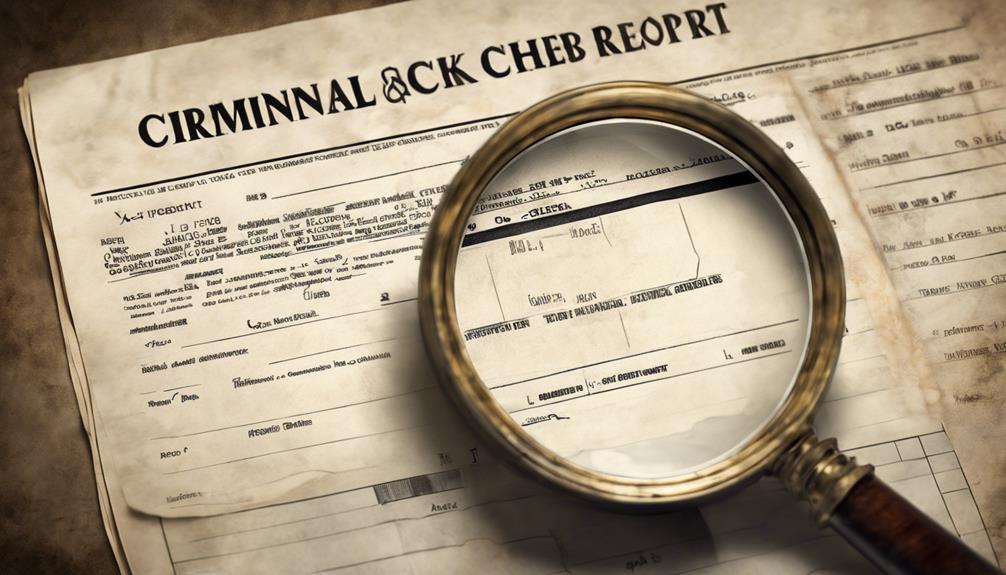Fingerprint background checks do not uncover expunged records, protecting past charges from disclosure. This guarantees privacy and equal employment opportunities for individuals with expungements. However, certain entities like law enforcement may still access expunged records. Understanding the differences between expungement and record sealing can be beneficial for individuals moving through the criminal justice system. Expunged records provide a fresh start by erasing past charges from public access, offering a chance to move forward positively.
Key Takeaways
- Fingerprint background checks do not reveal expunged records.
- Expunged records are concealed from public view on fingerprint-based checks.
- Law enforcement agencies may still access expunged records.
- FBI fingerprint checks do not show expunged records.
- Fingerprinting remains important for high-security clearances despite expungement.
Record Sealing and Expungement Differences

Record sealing and expungement present distinct differences in how criminal records are handled and accessed. When criminal records are expunged, they're completely destroyed, removing any trace of the charges from public access. This means that expunged records don't need to be disclosed when asked about one's criminal background, unlike non-expunged records.
On the other hand, sealed records, while limiting visibility, can still be accessed by specific entities such as law enforcement and some state agencies. Expunged records show a higher level of confidentiality as they're effectively erased from public records, making it appear as if the arrest or conviction never took place.
This difference in accessibility and visibility between sealed and expunged records can have significant implications for individuals seeking to move forward from past criminal activities without the burden of a visible criminal background.
Visibility of Expunged Records
Expunged records, once processed, are typically concealed from public view and shouldn't be detected on fingerprint-based background checks. When a record is expunged, it's effectively erased from public visibility; however, complete removal from all databases may take some time.
Despite their removal from public access, certain entities such as law enforcement agencies may still retain access to expunged records. The handling of expunged records by background checking companies can vary, but individuals can provide proof of expungement if necessary.
Generally, standard fingerprint background checks don't reveal expunged records, ensuring individuals a clean slate when undergoing such screenings. This protection is important for individuals seeking a fresh start after having their criminal records expunged through the legal process.
It's vital for those with expunged records to understand their rights and the limitations on the visibility of their past criminal history in FBI background checks.
DWI Record Sealing Criteria

Meeting specific criteria is necessary for individuals seeking DWI record sealing eligibility in Texas. To be considered for DWI record sealing, individuals must have no prior non-traffic offense convictions. Successful completion of community supervision, as well as the payment of associated costs, are essential requirements. Additionally, the blood alcohol content at the time of arrest should not have exceeded 0.20 percent for DWI record sealing in Texas. Not all DWI offenses qualify for record sealing; incidents involving accidents or multiple offenses may be excluded. First-time DWI convictions in Texas became eligible for record sealing in 2017 under specific conditions.
| Criteria | Description |
|---|---|
| Prior Convictions | No prior non-traffic offense convictions are allowed for record sealing. |
| Community Supervision Completion | Successful completion of community supervision is mandatory. |
| Blood Alcohol Content Limit | BAC at the time of arrest should not exceed 0.20 percent. |
| Excluded Offenses | DWI offenses involving accidents or multiple offenses may not be eligible. |
Felony Expungement Eligibility
Individuals seeking felony expungement eligibility in Texas must meet specific criteria related to the type of felony cases and presence of other convictions on their record. Only certain types of felony cases, such as those resulting in acquitted charges or completed diversion programs, are eligible for expungement.
Additionally, there's typically a waiting period before individuals can apply for felony expungement. To be eligible, there should be no other felony or misdemeanor convictions present on the individual's criminal record. Serious offenses like violent crimes or sex offenses are generally ineligible for felony expungement in Texas.
Felony expungement involves the process of clearing or erasing a criminal record from public view, providing individuals with a fresh start by removing the stigma associated with past criminal convictions. It's crucial for individuals to understand the specific eligibility requirements and criteria set forth by Texas law before pursuing felony expungement to secure a successful outcome.
Record Sealing Process in Kerrville

The record sealing process in Kerrville involves filing a petition with the court, usually after completing the sentence for the offense. Individuals seeking record sealing should be aware that certain crimes, like violent offenses, may not be eligible for this process in Kerrville.
Additionally, the waiting period for record sealing can vary based on the type of offense committed.
Sealing Eligibility Criteria
To be eligible for record sealing in Kerrville, offenders must have completed their sentence for the offense. Meeting the eligibility criteria is important for individuals seeking to have their criminal record expunged. Kerrville's guidelines specify that certain offenses, such as violent crimes, may not qualify for record sealing.
Understanding the requirements for sealed records is essential before initiating the process. Offenders in Kerrville need to file a petition with the court to request record sealing, which involves a waiting period based on the offense's nature.
Seeking legal assistance can be beneficial in navigating the complexities of the record sealing process in Kerrville, ensuring that all criteria are met before proceeding. By fulfilling the eligibility criteria and following the necessary steps, individuals can work towards sealing their records in Kerrville, aiming to move forward with a clean slate.
Process Involving Court Petition
After completing their sentence and meeting the eligibility criteria, offenders in Kerrville must file a petition with the court to initiate the record sealing process. This process involves seeking to restrict access to certain criminal records, aiming to prevent these records from being viewed during background checks.
The eligibility for record sealing in Kerrville can vary based on the nature of the offense and whether specific requirements have been fulfilled. Offenses like violent crimes may not be eligible for record sealing in Kerrville.
Typically, there's a waiting period post-sentence completion before individuals can start the record sealing process in Kerrville. Seeking legal guidance can be beneficial in maneuvering the complexities of the record sealing process and ensuring that all necessary steps are followed accurately.
Waiting Period Variations
Understanding the varying waiting periods for record sealing in Kerrville is important for determining eligibility based on the nature of the offense. The waiting period for the record sealing process can vary significantly, with certain offenses requiring longer periods before eligibility. Offenses such as violent crimes may have extended waiting periods, while less severe offenses might've shorter durations.
It's crucial to be aware of these waiting period variations to ensure compliance with the eligibility criteria for record sealing.
Navigating the waiting period requirements for the record sealing process in Kerrville can be complex and challenging. Consulting with a knowledgeable attorney can help individuals understand the specific waiting period applicable to their offense and guide them through the process effectively.
Expunged Records and Fingerprinting
Destroying or returning expunged records is an important step in guaranteeing they don't appear on FBI fingerprint-based background checks. When expungement is granted, agencies are mandated to eliminate or give back all related records promptly. However, this process might take some time to finalize, meaning there could be a delay between the expungement and the removal of records from the system.
To initiate the expungement process, individuals typically need to contact the relevant authorities or fill out the required forms. Despite expunged records being legally erased, FBI fingerprint-based background checks remain essential for uncovering any criminal history, even if it includes expunged details.
Therefore, individuals seeking to completely clear their records must make sure that the expungement process is correctly carried out to prevent any past criminal information from resurfacing during future background checks.
Retention of Fingerprints

Fingerprint retention is a permanent aspect of record-keeping, continuing even after a record has been expunged. Despite expungement, fingerprints remain on file at state and federal levels due to their physical characteristics that prevent destruction.
While state-level fingerprints aren't directly linked to expunged cases, they're retained for identification purposes. Fingerprint records are permanent and serve various identification and verification needs. Expunging a record doesn't eliminate the existence of fingerprints in the system, allowing them to still be used for identification.
The retention of fingerprints ensures that individuals can be identified accurately even after their records have been expunged. These records play an essential role in maintaining security and verifying identities when required. Hence, the permanence of fingerprint records serves as a reliable method for identification purposes, even in cases where the associated records have been expunged.
Scenarios Requiring Fingerprinting
Fingerprinting plays an essential role in various scenarios where detailed background checks are necessary. Individuals applying for positions requiring high-security clearance or specific professional licenses often undergo fingerprint-based screenings.
Law enforcement agencies may use fingerprints to access sealed or expunged records during criminal investigations or background checks.
Fingerprinting for Expunged Records
In certain circumstances, individuals with expunged records may be required to undergo fingerprinting for specific reasons related to their background checks. Law enforcement agencies often use fingerprint background checks to identify individuals who've had interactions with the legal system, even if those records have been expunged. This practice enables law enforcement to have a thorough understanding of an individual's past interactions with the law.
Additionally, some employers may request fingerprint background checks as part of their screening process for certain positions. By utilizing fingerprints, employers can potentially uncover past issues related to expunged records that could influence their hiring decisions. It's important to note that the use of fingerprints for background checks varies among different law enforcement agencies and employers, with some placing more emphasis on this method than others.
Access to Sealed Records
Access to sealed records through fingerprint-based background checks is limited to specific authorized parties such as law enforcement agencies and government entities. Sealed records are confidential and not readily accessible to the general public, providing individuals with some level of privacy regarding past offenses.
However, there are certain nuances and exceptions to take into account:
- Law enforcement agencies and government entities can access sealed records for official purposes, such as investigations and legal proceedings.
- Landlords, most employers, and lenders typically don't have the authority to view sealed records during standard background checks.
- Individuals with sealed records may still be required to disclose them in specific situations, such as when applying for certain licenses or permits.
While sealed records offer protection from public scrutiny, it's essential for individuals with such records to understand the limited access exceptions that exist for certain authorized entities.
Law Enforcement and Expungements
Law enforcement agencies may require individuals with expunged records to undergo fingerprinting in specific scenarios related to criminal investigations. Fingerprinting becomes essential when law enforcement encounters individuals with previously expunged records while investigating new criminal activities. Despite records being expunged, law enforcement can still access them through fingerprint checks in certain instances. This process aids in verifying the identity of individuals with expunged records during legal proceedings and background checks.
| Scenario | Purpose | Importance |
|---|---|---|
| Criminal Investigations | Verify identity and track past records | Critical for uncovering potential threats |
| Legal Proceedings | Confirm individual's identity | Ensures accurate legal representation |
| Background Checks | Assess individual's criminal history | Helps in determining eligibility and safety |
Frequently Asked Questions
Do Expunged Records Show up on Fingerprinting in Texas?
Expunged records should not show up on fingerprinting in Texas. Agencies are required to destroy or return expunged records, ensuring they are not accessible. The FBI, per federal regulations, should not display expunged records in fingerprint-based background screenings.
Do Expunged Records Show up on Fingerprinting in Pa?
Expunged records in Pennsylvania should not show up on fingerprint-based background checks. The expungement process, when done correctly, seals the records from public view. However, it may take time for all databases to reflect this change.
How Far Back Does a Fingerprint Background Check Go in Florida?
A fingerprint background check in Florida typically extends as far back as an individual's criminal history exists. The scope can include expunged records, subject to the agency's protocols. Authorized entities like law enforcement and government may access expunged records.
Do I Have to Disclose Expunged Records in Texas?
In Texas, individuals generally do not have to disclose expunged records when questioned about their criminal history. Expunged records are legally treated as if they never existed, providing individuals with the ability to deny their existence.
How Do Expunged Records Affect Fingerprint Background Checks?
When it comes to expunged records and federal background checks, there can be some gray areas. While expunged records may not show up on a standard background check, they can still appear when fingerprints are used. This means that even if a record has been expunged, it could still affect a fingerprint background check.
Conclusion
To sum up, while expunged records may not typically show up on standard background checks, they may still be visible in certain circumstances, like fingerprint background checks.
It's important to understand the differences between record sealing and expungement, as well as the criteria for sealing DWI or felony records.
Remember, when it comes to fingerprints and background checks, it's better to be safe than sorry – you never know when the other shoe might drop.









